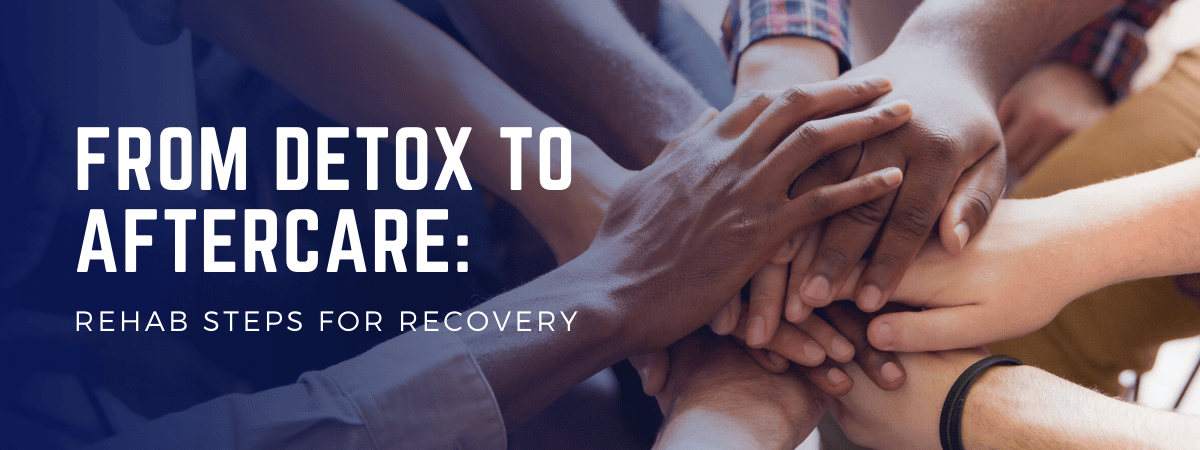

From Detox To Aftercare: Rehab Steps For Substance Use Recovery
From Detox To Aftercare: Rehab Steps For Substance Use Recovery
When you’re prepared to halt the use of addictive drugs or alcohol, your greatest opportunity for success is to start rehab. Yet, rehab is not a single step or treatment center. Drug and alcohol addiction rehab and recovery is a multi-tiered process with many stops along the way. But there’s no need to view that as a deterrent. Knowing the stages of rehab will help you have the courage to get started. You can feel certain that at every point, you’ll find caring, experienced professionals prepared to help you move forward and live a more fulfilling life.
Stages Of Rehab And Your Personal Journey
Substance addiction is both a physical and mental disorder. The several steps of rehab handle both aspects so you can attain a complete recovery. Different healthcare facilities may utilize different drug and alcohol treatment methodologies, but recognized rehab steps include:
- Inpatient detox
- Inpatient rehab
- Outpatient care
- Further aftercare
Each individual’s experience with drug and alcohol addiction is unique, and so is their journey to recovery. While you’ll encounter the same steps of rehab in Duluth as other people, how you accomplish those steps might be different. Many people repeat steps or restart completely, in some instances several times, before they ultimately make it to recovery. The important thing is to find competent therapy and always work step by step toward sobriety.
Substance Detox Is The First Step Toward Recovery
When it’s time to halt the use of habit-forming drugs or alcohol, your opening step is to detox from those substances and allow your body to clear them away. But, if you’re physiologically addicted to those substances, withdrawal can result and make you feel quite ill.
To succeed at detoxing, you must enter a medically guided detox program. You’ll live at a detox location and get 24-hour medical care to alleviate withdrawal symptoms and keep you out of danger. Detoxing can take one to two weeks.
If relapse occurs, you may always start over with detoxing whenever you’re ready to try again.
Substance Rehab Treats The Mental Side Of Addiction
While detox focuses on physical recovery, the following step of rehab revolves around the mental aspect of substance use disorder. At this phase, you’ll live in a rehab location far from triggers of drug or alcohol use. You’ll spend each day going to a range of therapies to address the mental health causes of your substance use and cultivate beneficial coping mechanisms to replace alcohol or drugs. Those therapies may include various forms of
- Personal counseling working one-on-one with a therapist
- Counselor-led group therapy
If you rely on substances to manage an untreated or undiagnosed mental health disorder, rehab is the right opportunity to work toward a diagnosis or begin proper treatment. Identifying and addressing co-occurring disorders is essential to recovery.
Just like detox, you can restart this phase of rehab at any time.
Progressing To Outpatient Treatment
You can stay at your rehab location as long as you need to feel like you’re ready to go home. But after you go home, treatment isn’t finished. You still are entitled to specialized care to stay sobert. At this stage, you’ll gain from outpatient treatment that lets you go home after your sessions and slowly return to your usual activities.
Outpatient treatment features continual psychiatric care from qualified clinicians to let you stay at home without relapsing. Mental health treatment centers that concentrate on drug and alcohol recovery are optimal for this stage of rehab in Duluth. They will have several levels of outpatient care to provide the structured routine that helps prevent relapse.
Partial hospitalization programs (PHP) require you to participate in mental health and addiction counseling during the week for several hours each day. You can live at home or a neighboring sober living facility when you’re entered in PHP.
Intensive outpatient programs (IOP) supply counseling during the week to keep you progressing in your recovery as you live at home and attend to work and other obligations.
You may also have medication management sessions at this stage. If you’ve started on medicine to curb substance cravings or regulate a mental disorder, it’s essential you have a medical expert helping you evaluate dosage and side effects.
Ongoing Aftercare Options
During every rehab step, you’ll craft an aftercare plan with a qualified therapist. Your aftercare plan will outline your next course of treatment to keep up your recovery momentum. In time, you’ll “graduate” through the steps of rehab and find yourself on the threshold of recovery.
It’s a great achievement to reclaim control of your life enough to no longer require persistent treatment. However, you won’t be left without different choices for future support. Here are a few things you might do:
- Continue seeing a credentialed therapist
- Attend twelve-step meetings or similar support groups
- Keep reminders around you of the things you learned through your recovery journey
- Build connections with supportive people
- Engage in beneficial pastimes and new hobbies
- Go back to any rehab step if you ever feel yourself in a struggle to remain sober
You might never be completely “cured” of addiction, but recovery is attainable when you follow all the steps of rehab in Duluth. Returning to those steps as many times as you need and relying on your support system will permit you to live a sober life in time.
Start The First Steps Of Rehab Near Duluth Today
No matter where you are in your journey to sobriety, Sunrise Detox Duluth will help you get the treatment you need. Give us a call at 470-327-8336 now or submit the following contact form to have an immediate consultation on where to seek treatment. All calls are private and free. We are here to guide you today.
 When mental illness lies at the root of your substance use, your first step toward recovery is treating both with detox and therapy.Read Full Article
When mental illness lies at the root of your substance use, your first step toward recovery is treating both with detox and therapy.Read Full Article Addiction affects family members too. Learn how to support a loved one with a substance use disorder and get support for yourself.Read Full Article
Addiction affects family members too. Learn how to support a loved one with a substance use disorder and get support for yourself.Read Full Article How can we support truckers with mental health and substance use disorders? The Drive podcast talks with Sunrise Detox to find out.Read Full Article
How can we support truckers with mental health and substance use disorders? The Drive podcast talks with Sunrise Detox to find out.Read Full Article

